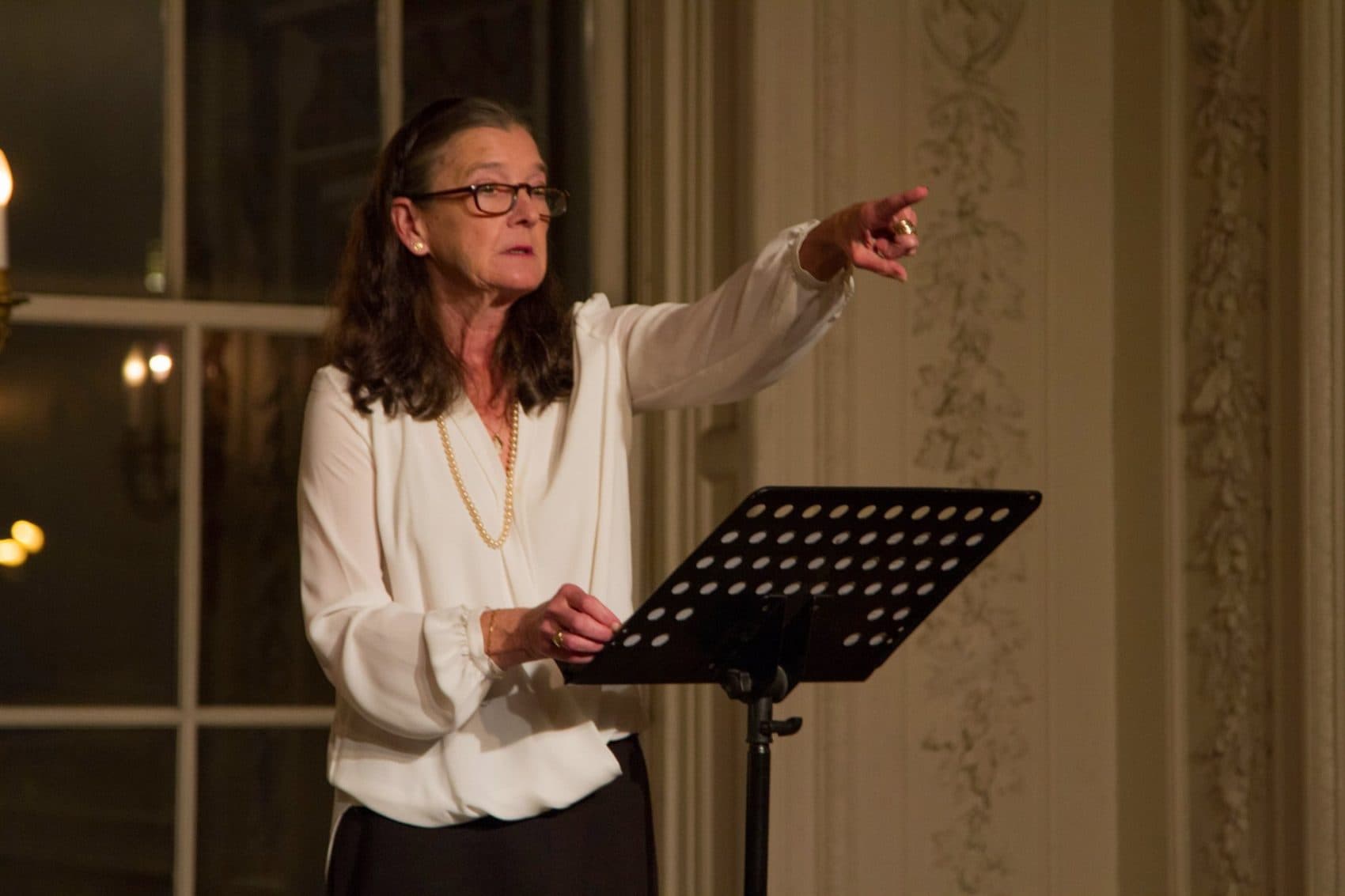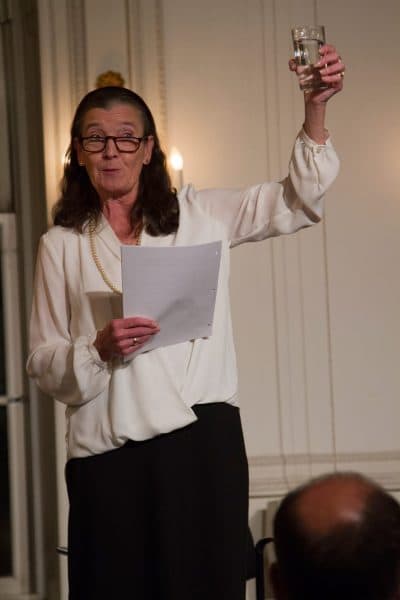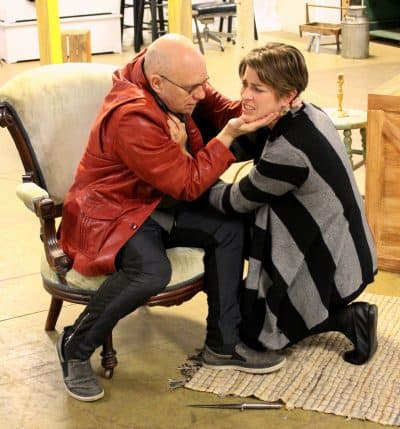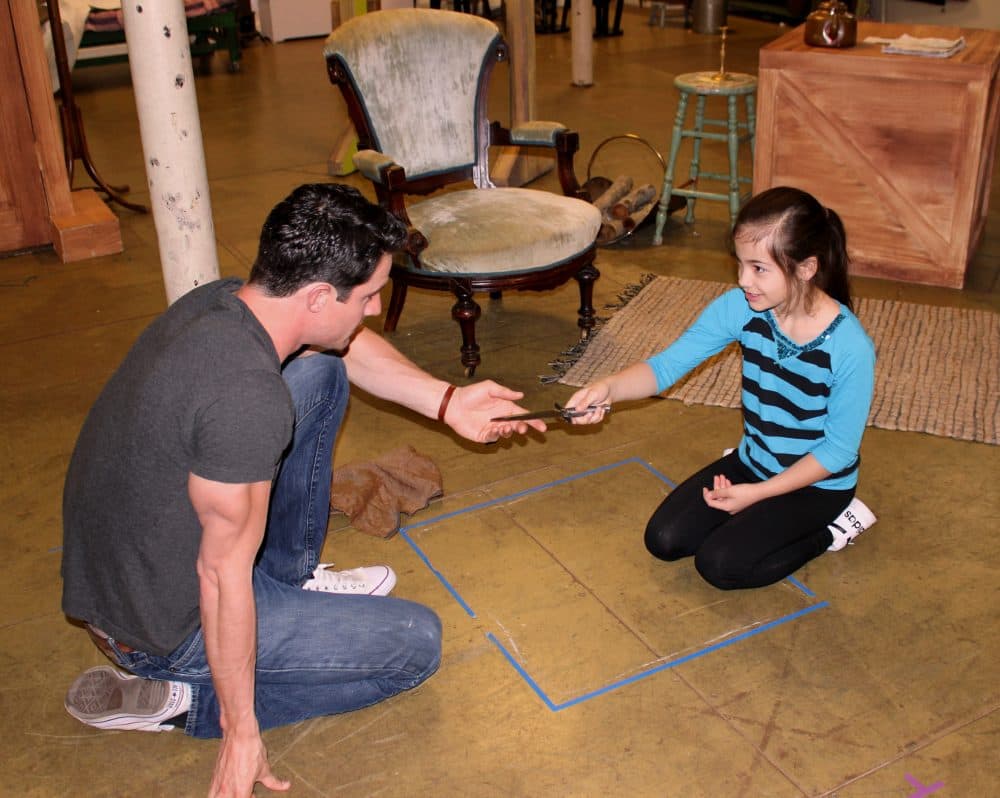Advertisement
Ignorance Or Denial? Israeli Stage And Stoneham Theatre Ask Contemporary Questions Of The Holocaust

Is ignorance really bliss? Or is it more a matter of avoiding the distressing parts of reality — ignoring them, as the word itself suggests?
In a pair of World War II-themed productions, two theater companies weigh questions of ignorance and innocence against the 20th century horrors of the Holocaust. With dramatic readings of an adaptation of Savyon Liebrecht’s story “The Strawberry Girl,” Israeli Stage tackles the thorny problem of what we know, and what happens when we don’t want to know. Stoneham Theatre’s upcoming production of Moira Buffini’s play “Gabriel” examines what it means to not comprehend evil even while living in its midst.
How People Exist In Times Of Horror
Israeli Stage’s readings of “The Strawberry Girl” will take place on Sunday, April 23, at Temple Beth Shalom in Needham, and on Monday, April 24 at Temple Israel of Boston, in observance of Yom Ha’Shoah, Holocaust Memorial Day. Acclaimed actress Nancy J. Carroll — who has graced area stages and has appeared in major Hollywood films like “Spotlight” — reprises her role in the one-act one-woman show.
Carroll plays a Nazi officer’s wife who, with her family, lives in military housing adjacent to Auschwitz and yet somehow remains oblivious to the atrocities going on right next door. Literally. When she catches a glimpse of a young girl dressed in rags and suffering frostbite, the narrator — who is never given a name — wonders why the little girl’s mother doesn’t look after her better. Though she clings to the illusion that the girl has a family and somehow chooses her bedraggled condition, her subconscious mind knows better. She starts having dreams in which the young girl appears, dreams that contrast the girl to the woman’s own healthy and well-cared-for son.
The narrator finally learns the truth about the young girl. At the same time the audience, too, uncovers a shock: the appalling secret of the strawberries the young girl cultivates for the pleasure of the Nazi officers’ wives.
The question that presents itself is, of course, whether the narrator, despite her uneasy misgivings, is truly clueless about what the Jews suffer at the hands of her own husband and his colleagues, or whether she’s in denial.
“All we’re given off the script is that the woman does not know,” Guy Ben-Aharon, Israeli Stage’s founder and producing artistic director, said in a recent interview. “She’s got this husband who barely speaks to her; she’s got a son, who wouldn’t know; and she’s got these two friends, who neither of them will tell her, except for that moment when she comes in with a dress [brought to her from the camp by her husband] and [one friend] is like, ‘Ooh, don’t wear that.’ "

“I think we want to bring up questions of delusion within reality, and how do people exist in times of horror? I think that’s the interesting question to ask,” Ben-Aharon added. “And I can tell you, we’ve done this show in a few synagogues before and the conversation always lasts for as long as the show afterwards because people are very disturbed by seeing it. And then people naturally start to talk about Syria; and people naturally start to talk about the horrific things that are happening in neighborhoods around them, [such as] shootings in Mattapan.”
That sort of community engagement is exactly what Israeli Stage is going for. “It’s amazing how many people we’ve seen in the audience over and over again. I think we’ve done it seven or eight times,” Ben-Aharon said. “The appeal for this is, I think, [that] the conversation around Yom Ha’Shoah, Holocaust Memorial Day, is usually stuck to fact and stuck very much within one narrative, and I think this opens up a relatability of saying ‘Never Again’ in a way that’s much stronger and far more poignant because it puts the audience in the uncomfortable seat.”
That discomfort provokes reactions, and those reactions become part of the conversation. “Every time we do that show somebody gets up and yells, ‘How could she not have known?’ ” Ben-Aharon recounted. “And I always laugh, and my answer is, “So, what do you not know?’ ” Not that Ben-Aharon, who directs the readings, lets himself off the hook. “I mean, I wear a V-necked T-shirt every day, and that T-shirt costs $5.99, and it’s from H&M. And I would much rather not know who made this T-shirt so I could wear it for $5.99. But the truth of the matter is, we kind of know who makes it.”
Ben-Aharon said that Israeli Stage has enjoyed “a longstanding relationship” with Temple Beth Shalom in Needham. “We always have an ongoing conversation,” he noted; “ ‘What should our partnership look like this year?’ ” For this observance of Yom Ha’Shoah, Ben-Aharon asked Senior Rabbi Jay Perlman whether he might be willing to try something different. “I told him about the show, and I told him about where it’s been, and he said, “That sounds like a wonderful way to bring our community together, and spark dialogue.” So both in that performance and the performance at Temple Israel there’ll be a community-led dialogue right after the performance and then some time over food and tea and coffee for people to reflect. If they aren’t comfortable talking about it in the theater space, they can talk about it more informally.
“At Temple Israel in Boston it’ll really be a cross-congregational, cross-generational program, because we’re expecting about 80 to 100 teens to be in attendance,” Ben-Aharon continued. “The rest will be parents and [the program will be] open to the community, so it’ll really be a time to explore this from varying age perspectives as well, which is not something we get to do a lot. In the theater when we do shows it’s either student matinees or your average 58-70 year old audiences. Here’s a time we’re saying, ‘Let’s have a cross-generational dialogue.’ ”
Over the years, Israeli Stage has produced readings of the 40-minute show “seven or eight times,” Ben-Aharon reckoned. “It’s pretty fleshed out, because we’ve spent so much time with it since we first did it … our readings are real products. People come and they pay to see these readings, so we invest in them. And we’ve got Nancy Carroll, who — you could watch her read the phone book!”
The Nature Of Innocence
At Stoneham Theatre, the issue is more innocence than ignorance. Is innocence a state of trusting unconcern? Or could it be more a matter of a receptive mind — that of a child, for instance, or an amnesiac adult — serving as the proverbial blank slate, ready to receive whatever information and values individuals and institutions might choose to project onto it?
“Gabriel,” premiering at Stoneham on Thursday, April 27, includes both a child and an amnesiac man. It’s the story set on Guernsey Island during the Nazi occupation of the Channel Islands. The British government, not viewing the islands as important enough to wage a battle over, simply handed them over to the Nazis in 1940. Though many of the inhabitants fled to the mainland, many stayed behind, and most cooperated with their new masters.

Buffini’s play imagines a situation in which the family of 10-year-old Estelle discover an amnesiac young man they call Gabriel. Estelle’s family is in business with the Nazis, but they have qualms about simply turning Gabriel over to them. On the other hand, no one — not even Gabriel — knows which side he’s on. Like Estelle, Gabriel is, in a sense, on neither side — or, you might say, he’s beyond sides in the war, thanks to his innocence.
But the play looks at other forms of innocence, as well, such as the function of a governmental control of information. “The people on this island who remained did not know the horror of what was happening,” director Weylin Symes explained. “There was a labor camp on Guernsey [where] they brought in slaves from all over Europe, but there were no concentration camps on Guernsey. It certainly seemed like the majority of the islanders did not know the atrocities of World War II, and that certainly comes up in this play, too … Everyone is experiencing the war in a way that is very different from how most World War II stories are told, where people are in the midst of these atrocities.” But the characters in the play “are literally and figuratively on an island, and the war is mostly beyond them, even though they are dealing with it every day, but in a very certain way. The family that we meet in the story, how they make a living is trading stolen black market goods to the Nazi soldiers, so there’s so much complicity between them.”
In an age of fake news and volatile partisan politics, the lessons of the play — and of history — seem urgently relevant.
“Controlling information is power,” Symes said. “You know what, that’s the part where this production feels so much more relevant now than we thought [it would be]. If you don’t know there are concentration camps and the captain simply says the Jews are being relocated for their own protection, one might be inclined to believe that, right? … That becomes a power that the Nazis had, certainly on Guernsey but also elsewhere — the power of propaganda. If people don’t know what’s truly happening, there’s a real power in that.”
As for the amnesiac Gabriel, he “becomes something that everybody projects whatever they want on to him,” Symes said. “What’s interesting to me is he kind of represents the desire of everyone in the play to imagine life beyond the scope of this war. That’s what I found very interesting. Everyone in the play, even though the war is not as violent or extreme on Guernsey as it is elsewhere, their entire lives are defined by this war, and they get the character of Gabriel who lets them imagine for a moment: ‘What if I lived my life beyond this war?’ That, I found really compelling.”

The production features many well-known Boston area actors, a number of them Stoneham Theatre alums. Alexander Molina plays the title character; joining him are Cheryl McMahon, Thomas Derrah, Georgia Lyman and Josephine Moshiri Elwood. Also: Stoneham Theatre Young Company alum Marissa Simequi, who plays Estelle.
“In my opinion, the entire play is seen through [Estelle’s] eyes,” Symes said. “That’s why the play is a little stylized and a little melodramatic, because we are seeing her perception of events. It was vital to me that we cast it as age-appropriately as possible. Actually, Marissa is a little younger then the role — she’s 9 … she’s just an incredibly talented young actor. It was a pretty easy decision for us when she came in to read. She pretty much wowed all of us, and she’s been wowing the cast as we’re going through the rehearsal process.”
The play calls for a certain chemistry between the actors portraying the child and the amnesiac men, to balance and contrast the kinds of innocence they represent, but when casting the part of Estelle “it was more important to me that this actor be believably 10 years old,” Symes said. “I think the innocence and naiveté of a 10-year-old girl is very hard to mimic in an older actor, and that’s what she brought to the table. She’s this incredibly open, genuine, sincere 10-year-old girl, and that’s what I wanted.”